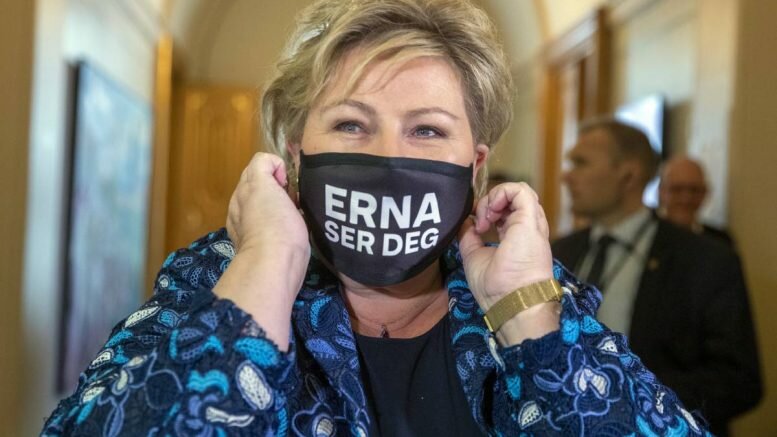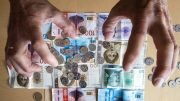In 2020, Norway has experienced an economic setback without precedent since the war.
Economic activity has been on the rebound in the last few months, but the road ahead remains fraught with uncertainty.
The fiscal budget for 2021 is aimed at helping Norway recover from the coronavirus crisis.
“We will have to live with the coronavirus pandemic next year as well. The fiscal budget shall, therefore, ensure both effective infection control and maximum job creation.
“Some industries will still need additional help to get through the crisis.
“At the same time, we shall facilitate economic growth and the green transition in order to meet the challenges facing us,” Minister of Finance Jan Tore Sanner said.
Producing More and Making Working Life More Inclusive
The fiscal budget for 2021 is based on the government’s coronavirus crisis exit strategy, named “Producing More and Making Working Life More Inclusive.”
The economic policy will have the following goals:
- Get people back to work: Help businesses get going again all over the country and get as many people as possible back to work.
- Diversify the economy: Create more jobs, in more industries, all over the country. This growth must come in the private sector. Investments in road and rail transport. Improvement of operating conditions for business.
- Create a green future: Enable businesses to create green jobs and a more sustainable future.
- Build skills: Ensure that more people complete upper secondary education and acquire the skills needed to thrive in the labour market and the business sector of the future. Evolve the Education Initiative 2020.
- Make society more inclusive: Providing everyone the opportunity to participate, in both working life and society in general.
- Preserve security and trust in Norwegian society and maintain a strong international involvement.
“In the fiscal budget of 2021, the government is continuing its long-term effort to strengthen the Norwegian economy’s sustainability and resilience.
“Although the economy is now doing better, I need to emphasize that the crisis is not over.
“The budget we are presenting today provides for measures to keep the corona spread under control, and serves to create economic growth and jobs,” the Minister of Finance said.
In 2020, it has been necessary to launch extensive economic measures to reduce the pandemic’s negative impact.
In line with the fiscal rule, the government has increased the structural non-oil deficit to support economic activity and jobs and reduce unemployment.
Expansionary fiscal policy
“We will do everything in our power to ensure that Norway emerges from this crisis in the best possible position, as well as to prevent the young from having to foot the bill,” the Minister of Finance noted.
Next year’s budget is based on the premise that there is still a need for an expansionary fiscal policy stance, although on a smaller scale than this year.
Many of the temporary emergency measures introduced in immediate response to the outbreak are phased out. The structural non-oil deficit is reverted to the long-term guideline of three percent of fund value.
Spending is nonetheless significantly higher than before the pandemic started, and the budgets for 2020 and 2021 will, all in all, boost economic activity and job creation next year.
These are the key measures:
- Get people back to work
- Expansionary fiscal policy stance to be maintained in 2021, to stimulate economic growth nationwide
- Broad income tax reductions
- 7,000 new labor market programme places
2. Diversify the economy
- Tax changes to boost business:
- Further reduction of the tax on operating assets
- Increase the tax-exempted benefit on employee purchases of shares of the employing company
- Restructuring of power generation taxation – provides companies with liquidity when they invest
- 15-percent withholding tax on the payment of interest and royalties
- Simpler rules
- NOK 45 billion for research and development
- Major road and railway investments
- Continued high priority to innovation and export promotion measures
3. Create a green future:
- Increase CO2 tax
- NOK 2.7 billion for CO2 capture, transport, and storage
- “Green platform”
- Climate-friendly transport solutions
- Continue measures to promote green shipping and fleet renewal
4. Build skills:
- 5,000 additional university and university college places
- 2,100 additional higher vocational education places, including the Industrial Trade School
- Facilitate an increase in upper secondary education completion rates
- NOK 900 million for the “Lifelong Learning” skills reform
- Make it easier to combine education and work
- Extend the scope for combining unemployment benefit with skill-enhancing training programmes until July 1
5. Make society more inclusive:
- Labor market programmes: Prioritise youth and vulnerable groups
- The Inclusion Initiative:
- Job support
- Mentor scheme and wage support
- On-the-job training
- Training coordinator
- Integration:
- The Job Opportunity Scheme
- Language training
- Freedom from negative social control
- Interpretation services
6. Preserve security and trust in Norwegian society and maintain a strong international involvement
- Increase child benefit and lump-sum maternity benefit
- Expand trial project on leisure activity cards for children
- Increase grants for participating in holiday and leisure activities
- Expand discount schemes under the after-school leisure activity programme
- Prioritize strong hospital funding and high-quality health services
- NOK 3.5 billion increase in defense sector appropriations
- Keep the 400 new police jobs
- Maintain development assistance at 1% of GNI
Source: Ministry of Finance / Norway Today






Be the first to comment on "Everything you need to know about Norway’s 2021 budget"